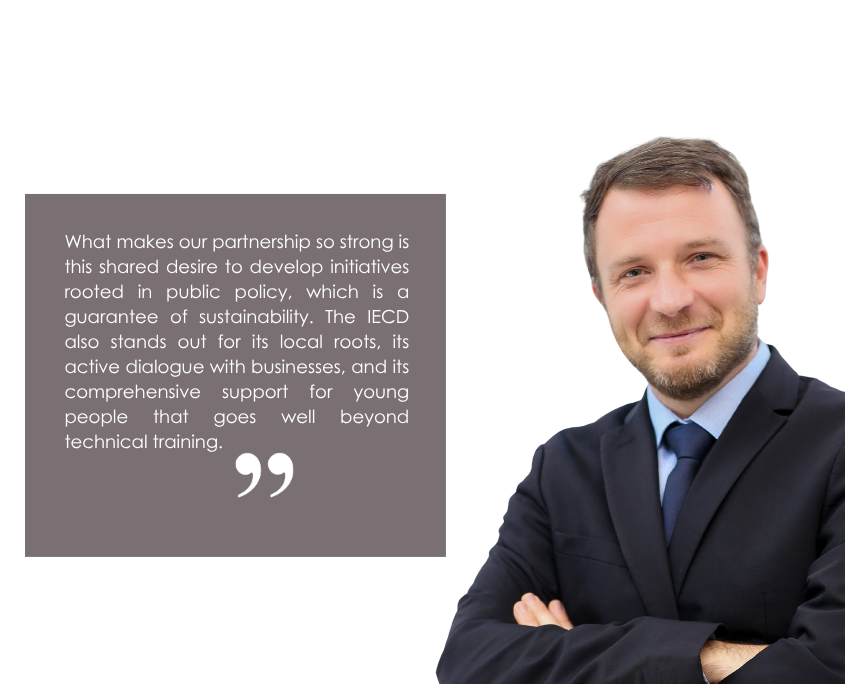French Development Agency
Christophe Cottet
Director of the Tunisian agency
Your collaboration with the IECD began in 2020 in Liberia with the launch of the STRIVE (Strengthening Integration through Vocational Education) project, the aim of which is to promote the socio-professional integration of young people in promising sectors of the economy and to develop new economic opportunities, particularly in rural areas. It has continued in Tunisia since September 2024 with the New Chance Scheme project.
How would you describe the IECD’s approach and added value in implementing these large-scale initiatives? How would you assess IECD’s capacity for innovation and its local roots?
I have had the chance and opportunity to follow the projects implemented by the IECD in both Liberia and Tunisia. The IECD shares a long-term vision of its projects with the AFD. Together, we build actions that are in line with public policies, which ensures real coherence and sustainability. Whether in Liberia or Tunisia, two very different contexts, I have seen the IECD’s ability to adapt its interventions while maintaining this strategic and structured approach. It is this complementarity of vision and method that makes our partnership so effective.
In your opinion, what are the main keys to success that work in both Tunisia and Liberia when it comes to youth and employment?
I believe there are two key elements: firstly, constant guidance towards employment, particularly through active dialogue with local businesses to ensure that the training we offer matches real needs. Secondly, overall support for young people, which goes well beyond technical training: we also work on soft skills, professional posture and presentation skills, which are often neglected but crucial to successful integration.
And these two keys to success are just as present in the way we support the training centres in Liberia as they are in the way we deploy the Nouvelle Chance schemes in Tunisia.
AFD is involved in these countries in projects linked to employability and entrepreneurship. What differences, similarities, issues and challenges do you see between these two development contexts?
Liberia is marked by great institutional fragility, while Tunisia, although facing post-revolutionary challenges, has a more structured state. The methods of support and intervention are therefore adapted to meet the expectations of the governments of both countries. Despite these differences, the issues are similar: youth unemployment, the need for market-driven training and the mismatch between young people’s aspirations and economic realities. In both countries, young people want to move away from the traditional occupations practised by their families, particularly in agriculture, and aspire to new opportunities, often in digital technology or services. This is where organisations like IECD know how to adapt their responses to these expectations, while taking account of local realities to create models of success.
At a time when public development aid is being called into question, how do you see the future for international development, particularly in Africa? How do you see the role of civil society organisations such as the IECD in the economic development of countries evolving? What advice would you have?
We are indeed at a time when official aid is being called into question, in both donor and recipient countries. There are fundamental debates about its legitimacy, its effectiveness and its alignment with the sovereignty of the countries of the South. In this context, civil society organisations such as the IECD have a key role to play, provided that they demonstrate their added value: technical expertise, implementation efficiency, quality of results and proper use of funds. It is these guarantees that make it possible to defend the usefulness and relevance of aid.
But beyond these considerations, we are witnessing a significant shift in the paradigm of international cooperation. We are gradually moving away from the logic of public development aid, which is often perceived as a form of assistance that is no longer desired either in the North or in the South, towards that of Solidarity and Sustainable Investment. This new approach is not incompatible with the idea of solidarity on an international scale between countries with different levels of income. However, it is based above all on the notion of partnership (rather than aid), shared interests and efficiency.
The last word?
I would like to pay tribute to the quality of the collaboration between the IECD and the AFD, and in particular to the commitment of the IECD teams. A development project is never a straight line, and you have to be prepared for twists and turns and adjustments. Despite the interest of the mission, it is not that simple and everyone knows the strength and willpower needed to overcome the obstacles. One of IECD’s strengths is its ability to keep the flame burning and to maintain high standards. Thank you for your support!


